
July 15
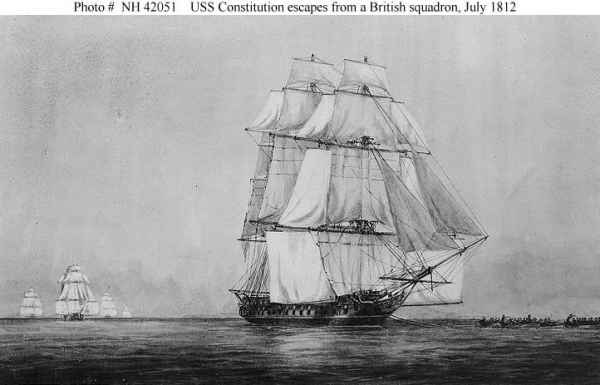
1812 (July 15–18): The USS Constitution, en route to Annapolis, runs into a squadron of British ships led by HMS Guerriere. In a three day chase, the Constitution's Captain, Isaac Hull, will successfully outrun and outmaneuver the British squadron. [For further details, Click here.]
1892 Birth: Walter Benjamin: German Marxist literary critic and philosopher. He was at times associated with the Frankfurt School of critical theory, and was also greatly inspired by the Marxism of Bertolt Brecht and the Jewish mysticism of Gershom Scholem. Benjamin allegedly committed suicide in Portbou at the Spanish-French border, attempting to escape from the Nazis. The circumstances and date of his death are unclear. He appeared to be ill when he arrived in Portbou and his party would be denied passage across the border to freedom. While staying in the Hotel de Francia he took some morphine pills and he died on 27 or 28 September 1940. The fact that he was buried in the consecrated section of a catholic cemetery would exclude a suicidal death.
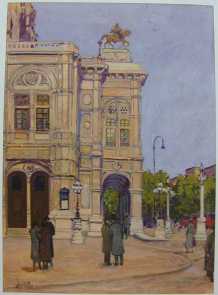
1908 Letter from Vienna: Hitler writes to "Dear Gustl", his best friend and Vienna roomate, August Kebizek, who is visiting relatives in Linz during the Easter break:
Called on Riedl [treasurer of Kubizek's musicians union] and did not find him until Thursday evening, when I was able to give him the money. My heartiest thanks for your letter and especially for the postcard. It looks very prosaic, I mean the fountain. Since you left, I have been working very industriously, often up till two or three in the morning. I will write you again when I leave. [For further details, Click here.]

1915 World War I: Various:
List Regiment: Gefreiter Adolf Hitler's 16 Reserve Infantry Regiment continue to occupy a position at Fromelles—pictured above in a drawing by Hitler—on a level field with water channels, willow trees and willow stalks. In the distance towards the enemy lines lies an insignificant wood with barbed wire entanglements. Under the direction of their defense-minded commander, Lieutenant General Gustav Scanzoni von Lichtenfels, the regiment works ceaselessly day and night to further fortify their position at Fromelles while fighting off repeated assaults by the enemy. [For further details, Click here.]
Thule Society:[The] sensational image of the Thule Society and its members is almost entirely a fictional invention. Hitler never attended a single meeting of the Thule Society. While the founder of the Thule Society, Rudolf von Sebottendorff, was certainly interested in the occult, a detailed diary of its regular meetings from 1919 to 1925 maintained by its secretary, Johannes Hering, mentions only two lectures on such topics. On 31 August 1918, Sebottendorff gave a talk on dowsing, of which Hering disapproved, commenting that occultism brought dubious members into the Thule from time to time; and on 23 February 1919 a certain Wilde lectured on occultism. All other lectures and excursions were devoted to such themes as megalithic culture, the original homeland of the Teutons, Germanic myths and poetry, the Thule legend, the Jews and Zionism, and current political issues. Goodrick-Clarke traces the theory of an occult inspired Nazism to a French Christian mystic, Renee Kopp who, in 1934, wrote of invisible spirits influencing Hitler. Later, the self-proclaimed German rocket engineer, Willy Ley, in 1947 wrote an article for a pulp fantasy magazine ridiculing pseudoscience in Germany, which he claimed included a Berlin sect attempting to conjure up the mysterious vril force described by British novelist Edward Bulwer-Lytton in his The Coming Race (1871).
Heinrich Albert: Head of German propaganda in America, accidentally leaves his briefcase on a subway in New York. A secret service agent retrieves it and exposes the existence of an extensive espionage network and subversive activities across the nation. German consuls, embassy staff, officials of the Hamburg-American Steamship Line and many German-Americans are implicated.
1916 World War I: List Regiment: Gefreiter Adolf Hitler endures trench warfare in Flanders (Artois) with 3 Company, 16 Reserve Infantry Regiment. [For further details, Click here.]
1917 World War I: List Regiment: Gefreiter Adolf Hitler's 16th RIR remain deployed for Phase 1 operations in Flanders, Belgium. [For further details, Click here.]
1918 World War I: The Second Battle of the Marne begins:
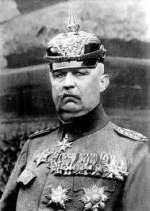
On this day in 1918, near the Marne River in the Champagne region of France, the Germans begin what would be their final offensive push of World War I. Dubbed the Second Battle of the Marne, the conflict ended several days later in a major victory for the Allies.
The German general Erich Ludendorff, convinced that an attack in Flanders, the region stretching from northern France into Belgium, was the best route to a German victory in the war, decided to launch a sizeable diversionary attack further south in order to lure Allied troops away from the main event. The resulting attack at the Marne, launched on the back of the German capture of the strategically important Chemin des Dames ridge near the Aisne River on May 27, 1918, was the latest stage of a major German offensive—dubbed the Kaiserschlacht, or the "Kaiser's battle"—masterminded by Ludendorff during the spring of 1918.
[Twenty-three] divisions of the German 1st and 3rd Armies attacked the French 4th Army east of Reims, while 17 divisions of the 7th Army, assisted by the 9th Army, attacked the French 6th Army to the west of the city. The dual attack was Ludendorff's attempt to divide and conquer the French forces, which were joined by 85,000 U.S. troops as well as a portion of the British Expeditionary Force (BEF), most of which were located in Flanders.
When the Germans began their advance after an initial artillery bombardment, however, they found that the French had set up a line of false trenches, manned by only a few defenders. The real front line of trenches lay further on, and had scarcely been touched by the bombardment. This deceptive strategy had been put in place by the French commander-in-chief, Philippe Petain.
As a German officer, Rudolf Binding, wrote in his diary of the July 15 attack, the French "put up no resistance in front . . . they had neither infantry nor artillery in this forward battle-zone . . . . Our guns bombarded empty trenches; our gas-shells gassed empty artillery positions . . . . The barrage, which was to have preceded and protected [the attacking German troops] went right on somewhere over the enemy's rear positions, while in front the first real line of resistance was not yet carried." As the Germans approached the "real" Allied front lines, they were met with a fierce barrage of French and American fire. Trapped and surrounded, the Germans suffered heavy casualties, setting the Allies up for the major counter-attack they would launch on July 18.
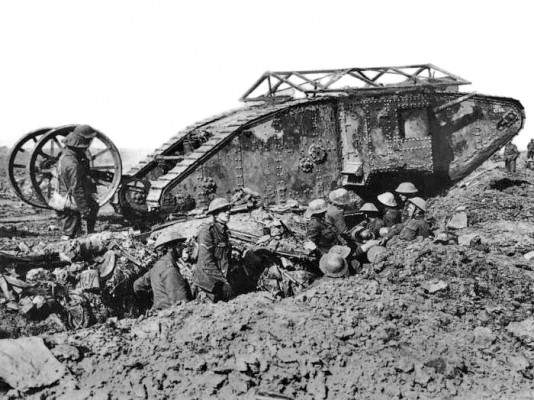
Ludendorff launches the last great German offensive of the war: the Second Battle of the Marne: Gefreiter Adolf Hitler's 16th RIR follows the 23rd and First Guard divisions into the Marne valley. While German troops manage to gain some territory in the first three days, the French are well-prepared for a counter-attack (July 19), with the assist of 28,000 fresh American troops. Adolf Meyer:
The descent into the Valley of the Marne, the countless smoking farmsteads, the advancing German assault columns and the peacefully flowing river offered an unforgettable sight to all 16-er's. [For further details, Click here.]
1927 Austria: Massacre of July 15, 1927:
During the Austrian July Revolt of 1927 (also known as Black Friday), 84 protesters were killed by Austrian police forces, while four policemen died, on 15 July 1927. More than 600 people were injured. The clash was the result of conflict between the Social Democrats and an alliance including wealthy industrialists and the Roman Catholic Church in Austria. Both paramilitary forces had been created during the 1920s, namely the right-wing Heimwehr in 1921-1923 and the left-wing Republikanischer Schutzbund in 1923. A clash between those groups in Schattendorf, Burgenland, on 30 January 1927 resulted in the death of a man and a child. Right-wing veterans were indicted for those deaths at a court in Vienna in July, but acquitted in a jury trial. This led to a general strike which had the aim of bringing down the government headed by Chancellor Ignaz Seipel. Massive protests resulted in a fire at the Justizpalast in Vienna. Police minister Johann Schober attempted to suppress the protests with force, which resulted in 84 deaths.
[See: Austria: The Other Germany.]1933 Four-Power Pact:
Representatives of Britain, France, Germany, and Italy signed in Venetian Palace in Rome a diluted version of Premier Benito Mussolini's Four-Power Pact proposal. The treaty reaffirmed each country's adherence to the Covenant of the League, the Locarno Treaties, and the Kellogg-Briand Pact. Premier Mussolini's goal was to reduce the power of the small states in the League of Nations with a bloc of major powers. In practice, the Four-Power Pact proved of little significance in international affairs.
1934 Holocaust: Nazis march the length of the Kurfuerstendam in Berlin, wrecking Jewish owned shops and attacking all those they believe to be Jewish. (THP)
1935 Holocaust: The Wehrmacht chief of staff issues orders banning all German soldiers from shopping in "non-Aryan" shops and stores. (THP)
1936 Various:
Italy: The League of Nations and Western Powers lift economic sanctions:
By the mid-1930s . . . the league was being consumed by its own inability to exert power, and the rise of fascism in Italy and Germany quickly made it look even more irrelevant. Nazi Germany withdrew from the league in 1933, and Italy attacked Ethiopia in 1935. Neither country was penalized for its actions, but by 1936 the league had become so marginal that virtually all meaningful diplomacy was being conducted on a bilateral level. With the onset of the Second World War, the league had all but ceased to function, although it continued to officially exist until 1945 when its duties were formally usurped by the United Nations. Although the league ultimately failed, the world's experience with it was not entirely without merit. As the international community's initial experiment with collective security, it helped highlight problems with the league's covenant that were corrected in the UN charter.
Holocaust: Professor Mollison, an anthropologist at the University of Munich, recommends to the Ministry of the Interior that the costs of expert reports on "Aryan" or Jewish origins should be recovered from the applicants. "It is not advisable to provide such a time-consuming investigation free for those who claim Aryan origins when they know they are not entitled to do so." (THP)
1937 Holocaust: The German-Polish Convention of May, 1922 expires along with its protection of Jewish minority rights in Upper Silesia. The Jews of Upper Silesia are now exposed to the full rigors of Nazi rule. (THP)
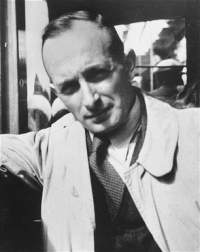
1939 Holocaust: A Central Office for Jewish Emigration (Zentralstelle fuer Juedische Auswanderung) opens in Prague under the direction of Adolf Eichmann. A branch office is set up in Brno. All Jews wishing to emigrate from the Czech Protectorate must request permission from these offices. (THP)
1940 World War II: Various:
Battle of Britain: The Luftwaffe carries out raids against British convoys in the English Channel as well as airfields and railway lines in SW England.
The Kanalkampf comprised a series of running fights over convoys in the English Channel and occasional attacks on the convoys by Stuka dive-bombers. It was launched partly because Kesselring and Sperrle were not sure about what else to do, and partly because it gave German aircrews some training and a chance to probe the British defences. In general, these battles off the coast tended to favour the Germans, whose bomber escorts massively outnumbered the convoy patrols. The need for constant patrols over the convoys put a severe strain on RAF pilots and machines, wasting fuel, engine hours and exhausting the pilots, but eventually the number of ship sinkings became so great the British Admiralty cancelled all further convoys through the Channel. However, these early combat encounters provided both sides with experience. They also gave the first indications some of the aircraft, such as the Defiant and Bf 110, were not up to the intense dog-fighting that would characterise the battle. [See: Why Did Hitler Lose The Battle of Britain?]
Baltics: Plebiscites conducted in Soviet occupied Lithuania, Latvia, and Estonia are announced, showing what is described as a unanimous desire for union with the USSR. Stalin soon annexes the three nations into the USSR as constituent republics.
Threatening an invasion and accusing Estonia, Latvia and Lithuania of violating the terms of mutual assistance pacts as well as forming a conspiracy against the Soviet Union, the latter presented ultimatums, demanding new concessions, which included the replacement of governments and allowing an unlimited number of troops to enter the three countries. In the conditions of international isolation, the governments acceded to demands without offering any military resistance, and within a few days, the countries were invaded and occupied by several hundred thousand soldiers of the Red Army. A few days later, led by Stalin's close associates, the local communist supporters and those brought in from Russia, proclaimed new "people's governments" in the three occupied countries. In the following month, mock parliamentary elections were conducted by local communists loyal to the Soviet Union and all non-communist candidates were disqualified. The election results were completely fabricated: the Soviet press service released them early, with the result that they had already appeared in print in a London newspaper a full 24 hours before the polls closed.
1941 World War II: Various:
Garbo makes an appearance: [Master] spy Juan Pujol Garcia, nicknamed "Garbo," sends his first communique to Germany from Britain. The question was: Who was he spying for?
Juan Garcia, a Spaniard, ran an elaborate multiethnic spy network that included a Dutch airline steward, a British censor for the Ministry of Information, a Cabinet office clerk, a U.S. soldier in England, and a Welshman sympathetic to fascism. All were engaged in gathering secret information on the British-Allied war effort, which was then transmitted back to Berlin. Garcia was in the pay of the Nazis. The Germans knew him as "Arabel," whereas the English knew him as Garbo. The English knew a lot more about him, in fact, than the Germans, as Garcia was a British double agent.
None of Garcia's spies [was] real, and the disinformation he transmitted to Germany was fabricated—phony military "secrets" that the British wanted planted with the Germans to divert them from genuine military preparations and plans.
Among the most effective of Garcia's deceptions took place in June 1944, when he managed to convince Hitler that the D-Day invasion of Normandy was just a "diversionary maneuver designed to draw off enemy reserves in order to make a decisive attack in another place"—playing right into the mindset of German intelligence, which had already suspected that this might be the case. (Of course, it wasn't.) Among the "agents" that Garcia employed in gathering this "intelligence" was Donny, leader of the World Aryan Order; Dick, an "Indian fanatic"; and Dorick, a civilian who lived at a North Sea port. All these men were inventions of Garcia's imagination, but they leant authenticity to his reports back to Berlin—so much so that Hitler, while visiting occupied France, awarded Garcia the Iron Cross for his service to the fatherland.
That same year, 1944, Garcia received his true reward, the title of MBE (Member of the British Empire) for his service to the England and the Allied cause. This ingenious Spaniard had proved to be one of the Allies' most successful counterintelligence tools.
Barbarossa: Smolensk is taken, and another 300,000 Russian soldiers with it. German forces of Heeresgruppe Mitte (von Bock) encircle 300,000 Soviet troops in the Smolensk-Orsha pocket. The ultimate objective of Army Group Center was the city of Smolensk which commanded the road to Moscow. Facing the Germans along the River Dnieper and Dvina were stretches of the old Stalin line fortifications. The defenders were the 13th Army of the West Front, and 20th, 21st and Twenty-Second Armies of the Supreme Command Reserve. Another army, the 19th was forming up at Vitebsk while the 16th Army was arriving at Smolensk. It was the threat in the north from 3rd Panzer Army's 39th Panzer Corps that most worried the Soviets. [See: What Were Adolf Hitler's Major Blunders?]
Leningrad: In the outskirts of the city, hundreds of thousands of Soviet civilians, mostly women and teenagers, begin constructing over 300 miles of trenches and field fortifications.
1942 World War II: Various:
Units of 4 Panzerarmee capture Kamensk on the Donets:
Throughout June and the first half of July, the 1st and 4th Panzerarmee under Colonel-Generals von Kleist and Hoth respectively maintained their advance towards the Caucasus, and General von Paulus' Sixth Army continued towards Stalingrad, as set out in Hitler's Directive for the summer offensive. But, in late July, Hitler's Directive No. 45 meddled with the original plan, and against the judgment of Halder, Hoth and Kleist, swung the Panzer armies South-East, away from their eastward course. General Paulus and his Sixth Army continued, in accordance with the original plan, towards Stalingrad, but without the support of the Panzer armies. This made his position progressively weaker as his supply line became more extended and his rear more vulnerable. By 15th August, four weeks later, after a slow advance hampered by lack of fuel and poor supplies of food, ammunition and medical supplies, General Paulus was close enough to Stalingrad to issue his orders for an attack upon the city.
Holocaust: The first train leaves Holland for Auschwitz: 1,135 Dutch Jews are on board.
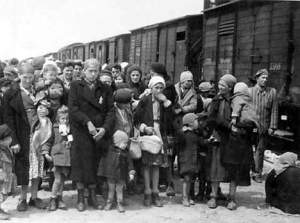
Testimony of SS private Boeck. Extracted from "Der Auschwitz Prozess", by Hermann Langbein, Vol. I, quoted in "Auschwitz: Technique and operation of the gas chambers - J.C Pressac, the Beate Klarsfeld Foundation, NY, 1989, p. 181:
Q: were you present at a gassing operation one day?
A: Yes, it was one evening. I accompanied the driver Hoeblinger. A transport had arrived from Holland and the prisoners had to jump from the wagons. They were well-off Jews. There were women with Persian furs. They arrived by express train. The trucks were already there, with wooden steps before them, and the people climbed aboard. Then they all started off. In the place Birkenau once stood, there was only a long farmhouse (Bunker 2) and beside it four or five big huts. Inside, the people were standing on clothes which were building up on the floor. The block leader and the sergeant, carrying a cane, were there. Hoeblinger said to me "let's go over there now." There was a sign 'to disinfection'. He said 'you see, they are bringing children now'. They opened the door, threw the children in, and closed the door. There was a terrible cry. A member of the SS climbed on the roof. The people went on crying for about ten minutes. Then the prisoners opened the doors. Everything was in disorder and contorted. Heat was given off. The bodies were loaded on a rough wagon and taken to a ditch. The next batch were already undressing in the huts. After that I didn't look at my wife for four weeks.
1944 World War II: Various:
Loot: From an internal Nazi report:
By July 15, 1944, the following had been scientifically inventoried: 21,903 Works of Art: 5,281 paintings, pastels, water colors, drawings; 684 miniatures, glass and enamel paintings, illuminated books and manuscripts; 583 sculptures, terra cottas, medallions, and plaques; 2,477 articles of furniture of art historical value; 583 textiles (tapestries, rugs, embroideries, Coptic textiles); 5,825 objects of decorative art (porcelains, bronzes, faience, majolica, ceramics, jewelry, coins, art objects with precious stones); 1,286 East Asiatic art works (bronzes, sculpture, porcelains, paintings, folding screens, weapons); 259 artworks of antiquity (sculptures, bronzes, vases, jewelry, bowls, engraved gems, terra cottas).
The Bomb Plot: Stauffenberg takes a bomb to a meeting in Rastenburg. Himmler and Goering are not present and Hitler leaves before the bomb can be planted. (THP)
Italy: the British Eighth Army (Leese) reaches the river Arno near Arezzo. The Italian government returns to Rome.
1945 Various
Italy declares war on its former Axis partner, Japan.
President Harry Truman disembarks from the heavy cruiser the USS Augusta (CA-31) in Antwerp, en route to Potsdam for the Conference.
1946 Nuremberg Tribunal: Defense summations continue in the Major War Criminals Trial. One point in common with nearly all of the arguments of the various Defense Counsel is that there is a major absence among the Defendants; Adolf Hitler himself. Your Honors, the Defense have now presented their views on that part of the Indictment which, had it been true, would have tragically incriminated the man Funk. One may think as one pleases about acts of violence during a political and economic struggle, especially in stormy revolutionary periods, but in the opinion of the Defendant Funk himself there can be no disagreement on one point, namely, with regard to the concentration camp atrocities committed for years, especially against the Jewish population. Anyone who participated in such unheard-of atrocities should be made to atone for them in the severest way, according to the opinion of the entire German people. A mere glance at the dock reveals the singularity of Schacht's case and the story of his imprisonment and defense. There in the dock sit Kaltenbrunner and Schacht. Whatever the powers of the Defendant Kaltenbrunner may have been, he was in any case Chief of the Reich Security Main Office. Until those May days of 1945, Schacht was a prisoner of the Reich Security Main Office in various concentration camps. It is surely a rare and grotesque picture to see jailer and prisoner sharing a bench in the dock. At the very start of the Trial this remarkable picture alone must have given cause for reflection to all those participating in the Trial: judges, prosecutors, and defense counsel alike. Mr. President, Gentlemen of the Tribunal: "War is a cruel thing, and it brings in its train a multitude of injustices and misdeeds." With these words of Plutarch's, Hugo Grotius begins his examination of responsibility for war crimes; and they are as true today as they were 2,000 years ago. Acts constituting war crimes, or considered as such by the opponent, have at all times been committed by belligerents. But this fact was always held against the vanquished parties and never against the victors. The law which was applied here was necessarily always the law of the stronger. 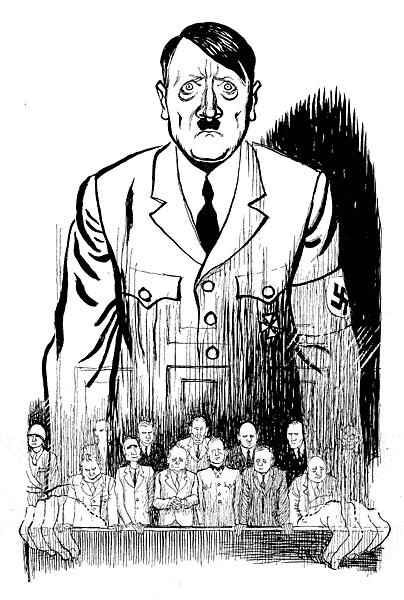
That is also the point of view of the Defendant Funk, which he expressed here on 6 May 1946 when he replied to the American prosecutor from the witness stand that as a man and as a German he felt deeply guilty and shamed for the crimes which Germans committed against millions of poor people.
Gentlemen, I have now reached the end of my consideration of the Funk case as far as criminal law is concerned, And that is the duty of the Defense in this Trial.
The examination of the evidence with regard to the Funk case has, in the opinion of the defendant, produced proof that a legal guilt, a criminal guilt, on his part does not exist, and that he can ask you for his acquittal with a clear conscience because he has never committed any criminal acts in his life.
Your task as judges will now be to find a just verdict for the Defendant Funk, a verdict which will not make him atone for the crimes of others, crimes he could not prevent and which he may not even have known about, but a verdict which only establishes the degree of his own guilt and not the degree of his political guilt, but of his criminal guilt which is the sole object of these proceedings. This verdict should be valid not only for today but also recognized as just in the future when we shall view these terrible events in the proper perspective and dispassionately as we would ancient history; a verdict, Your Honors, which will not only satisfy the nations which you represent, but which will also be recognized as just and wise by the German people as a whole; a verdict, finally, which is not only destructive, retaliatory, and which will sow hatred for the future, but one which will make it possible for the German people to move forward toward a happier future of human dignity and charity, of equality and peace.
Schacht was banished to a concentration camp on the order of Hitler, as has been established here. The charge against him was high treason against the Hitler regime. The judicial authority, the Peoples' Court, headed by that bloodthirsty judge, Freisler, would have convicted him, had not his imprisonment turned into detention by the victorious Allied Powers. Since the summer of 1944 I was assigned to defend Schacht before Adolf Hitler's Peoples' Court; in the summer of 1945 I was asked to conduct his defense before the international Military Tribunal. This, too, is in itself a self-contradictory state of affairs. This, too, compels all those participating in the Trial to reflect on the personality of Schacht. One involuntarily recalls the fate of Seneca; Nero, as a counterpart to Hitler, put Seneca on trial for revolutionary activities. After the death of Nero, Seneca was charged with complicity in Nero's misgovernment and cruelties, in short, with conspiring with Nero. A certain wry humor is not lacking in the fact that Seneca was then declared a pagan saint by early Christianity as early as the fourth century. Although Schacht does not indulge in such expectations, this historical precedent nevertheless forces us to remain always conscious of the fact that the sentence to be pronounced by this High Court will also have to be justified before the judgment seat of history.
While more or less stable rules have been governing land warfare for centuries, in naval warfare the conceptions of the belligerents with regard to international law have always clashed. No one knows better than the British statesmen to what extent these conceptions are dictated by national or economic interests. I refer in this respect to noted witnesses such as Lord Fisher and Lord Edward Grey. Therefore, if ever in history a naval power would have had the idea of prosecuting a defeated enemy admiral, based on its own conception of the rules of naval warfare, the sentence would have been a foregone conclusion from the very indictment.
At this trial two admirals are under indictment for a naval war which has been termed criminal. Thus the Tribunal is confronted with a decision regarding conceptions of law which are necessarily as divergent as the interests of a naval power and a land power. It is not only the fate of the two admirals which depends upon this decision. It is also a question of personal honor.
1948 Death: John J. Pershing: military commander whose brilliant career earned him the title General of the Armies of the United States. The first general awarded the title since George Washington, Pershing was given a hero's burial at Arlington National Cemetery. He was born in Laclede, Missouri, on 13 September 1860, the first of six children. His mother taught him at home, helping to inspire in him a love of learning. He realized his dream of attaining a formal college education when he won a scholarship to the US Military Academy. After graduating from West Point in 1886, Pershing was given command of the 6th Cavalry Regiment in the West, where he participated in the Apache and Sioux campaigns. He was promoted to First Lieutenant of the 10th Cavalry Regiment in Montana, one of several segregated regiments formed after passage of an 1866 law authorizing the US Army to form cavalry and infantry regiments of black soldiers. Reflecting the racial prejudices of the era, the law also stipulated the units be commanded by white officers. Pershing expressed his admiration for the black soldiers under his command forcefully and often, earning for himself the honorary nickname of 'Black Jack'.
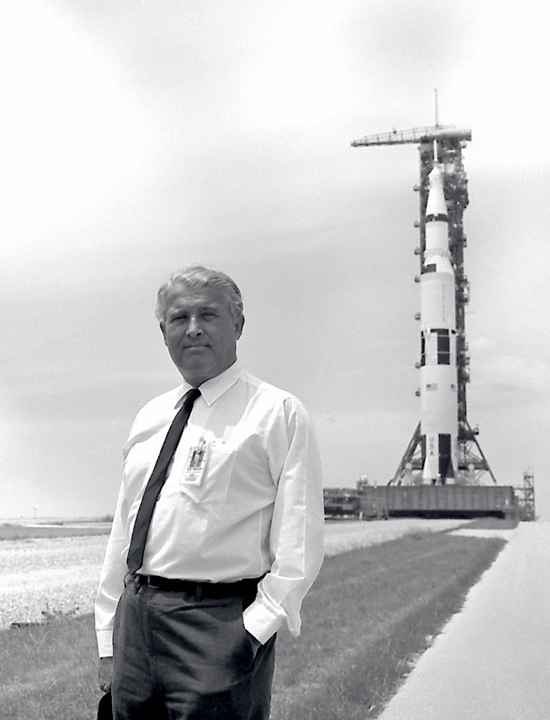
1975: The last Saturn 1B is launched at Kennedy Space Center. Werner von Braun, Hitler's former chief rocket scientist, who witnesses the launch, must have felt a good deal of pride that not one of his Saturn boosters had ever failed to complete its planned flight, a record unmatched by any other rocket design.
[See: Wunderwaffen: Hitler's Deception and the History of Rocketry.]1990 Soviet President Mikhail Gorbachev and visiting West German Chancellor Helmut Kohl hold talks on the issue of a united Germany's membership in NATO.
Edited by Levi Bookin (Copy editor) Click to join 3rdReichStudies Disclaimer: This site includes diverse and controversial materials—such as excerpts from the writings of racists and anti-Semites—so that its readers can learn the nature and extent of hate and anti-Semitic discourse. It is our sincere belief that only the informed citizen can prevail over the ignorance of Racialist "thought." Far from approving these writings, this site condemns racism in all of its forms and manifestations.
levi.bookin@gmail.com










Fair Use Notice: This site may contain copyrighted material the use of which has not always been specifically authorized by the copyright owner. We are making such material available in our efforts to advance understanding of historical, political, human rights, economic, democracy, scientific, environmental, and social justice issues, etc. We believe this constitutes a "fair use" of any such copyrighted material as provided for in section 107 of the US Copyright Law. In accordance with Title 17 U.S.C. Section 107, the material on this site is distributed without profit to those who have expressed a prior interest in receiving the included information for research and educational purposes. If you wish to use copyrighted material from this site for purposes of your own that go beyond 'fair use', you must obtain permission from the copyright owner.
Please Note: The list-owner and moderators of 3rdReichStudies are not responsible for, and do not necessarily approve of, the random ads placed on our pages by our web server. They are, unfortunately, the price one pays for a 'free' website.



